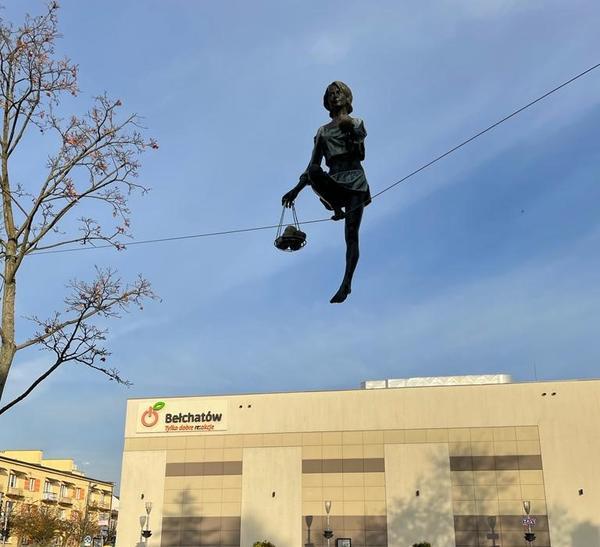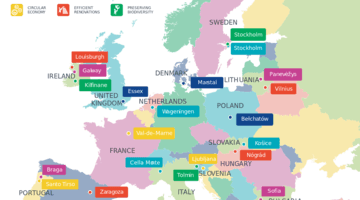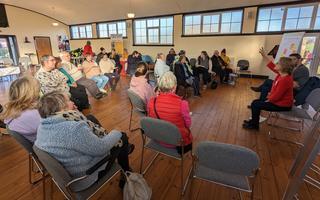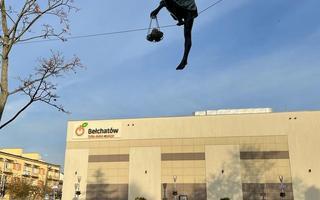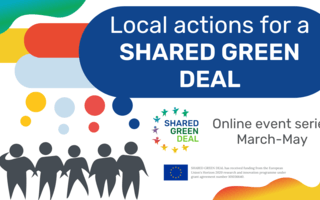The future starts now: design the tomorrow of Bełchatów
This experiment will seek to understand the role women see for themselves in the local community and economy, what potential they have to be employed in the transition to green energy, and what skills and conditions they need to make this happen.
Local context
Bełchatów is a town of approximately 60,000 inhabitants located on the lowlands near the geographical centre of Poland. The town developed rapidly after the discovery of lignite and became home to a mine and power plant. The power plant complex covers 18% of power demand in Poland. It is also the single largest CO2 emitter in the EU. The local community enjoys the highest income per capita in the voivodeship, but the female population has a lower employment rate than the male population and traditional family patterns persist, visible through the division of roles within marriages: the man works and earns a living while the woman takes care of the household and children. Due to EU climate policies and the fact that the mine will soon run out of lignite, the energy complex is set for closure and the transition to clean energy sources is expected to follow. The region will face the challenge of social and economic redefinition. The dominant reaction to this is currently denial.
Specific needs and challenges
Bełchatów has a higher rate of employment among men than women and a higher share of women among the unemployed. The majority of the power plant complex’s well-paid employees are men. These disparities disempower women when it comes to shaping the town since they are less economically independent, and have lower access to professional local networks. The employment reduction the complex will soon undergo to meet the needs of energy transition will affect mostly men, yet this will touch entire families, as men are often the only working members of the family. It will be necessary to open the local labour market to women and empower them to work.
Filling the gap in the engagement of women, youth and elderly in the process of just transition planning is a crucial part of this. Public debate on energy transition in Bełchatów is mostly dominated by men, the energy company and the national government. Until recently, the dominant local narrative for the future was one of coal extraction for decades to come; however, it has been shifting towards one of the necessity of change. Some residents and businesses remain resistant to such change, especially those who have been reliant on the coal industry their entire lives.
There might be political pressure from some stakeholders (e.g. the government, especially in an election year) to continue relying on coal.
Detailed description of the experiment
As there is some resistance to change in this region, innovative tools will be applied to create a friendly space for discussing and envisioning the future of the region. We will hold an improvisation workshop with the aim of using this art form as a tool to engage participants in conversations about the challenges and opportunities of the energy transition. Through this, participants can explore and express their ideas and perspectives in a fun and creative way, promoting open dialogue and active listening. The result might also include some new relationships and networking (applicable to all activities) centred around transition ideas.
Similarly, the storytelling workshop aims to provide a platform for individuals to share their personal experiences and perspectives related to the energy transition. By listening to each other's stories, participants can gain a deeper understanding of the challenges and opportunities that arise from this process. They might also see some patterns that create what we call local context. They can also identify common themes and values that can help come up with new narratives that will include female involvement.
The third event will be a discussion panel with relevant female stakeholders from the local community. They should be specifically chosen for their expertise in the field of clean energy and their understanding of the local context. The discussion will be focused on the potential role of women in shaping the clean energy transition in Bełchatów. They will be encouraged to share their ideas, concerns, and recommendations on how to empower women and ensure their active participation in the process. We may focus on their potential leadership skills and established positions across the local community.
Local engagement
The partners will reach out to local, regional and national authorities and policy makers. The local level includes authorities from Bełchatów and neighbouring municipalities. The regional authorities are the Lodz Voivodeship Marshal Office and Lodz Regional Development Agencies – the institutions leading the region’s just transition. National authorities include representatives of the Ministry of Development Funds and Regional Policy.
Civil society organisations will be another key group. Non-governmental organisations already cooperating with us are: Center for Ecological Activities Sources, Yes for Bełchatów Association and Bełchatów Just Transition Foundation, Fundacja Kultura Kresu and Opus.
Other stakeholders come from private and public businesses. We aim to involve representatives of the owner of the energy complex, who is the key employer in the region. The company’s trade unions will also be invited, as well as small and medium-sized enterprises.
Finally, we will involve representatives of local residents with a special focus on women, the youth and older generations.
Partners
Our partners include the Center for Ecological Activities Sources; Yes for Bełchatów Association and Bełchatów Just Transition Foundation; Fundacja Kultura Kresu (an NGO working for culture and nature in regions in transition); Opus (Łódź-based NGO working for open society through education, cooperation with NGOs, local authorities and business); the local government of Bełchatów; the Municipal Social Welfare Center; and local newspapers, portals and media.
Additional remarks
Social awareness of the challenges ahead of the region is low but on the rise; our experiment may capture this rise and also impact it. The experiment is also related to influencing and participating in just transition planning, which we know are in the initial phases from other Polish coal regions. These factors pose both risks and opportunities.
Local partner
Alliance of Associations Polish Green Network
Country
Poland
Number of inhabitants
60,000
City
Bełchatów
Website/social media
Contact
Magdalena Bartecka, Coordinator, magdabartecka [at] zielonasiec [dot] pl
Mateusz Kowalik, mateuszkowalik [at] zielonasiec [dot] pl
Spring 2023
Working on communication with partners: working out a subtle message on the entire experiment with a communications specialist
Summer 2023
Reaching out to local partners and building relations for further activities
Autumn/Winter 2023-2024
3 workshops conducted in the region
Winter/Spring 2024
Final event held
Related Green Deal Priorities
TIMELINE
Case Study Guides
|
Find out more


CONTACT
For further details please contact co-leads Professor Chris Foulds (chris.foulds@aru.ac.uk) and Professor Rosie Robison (rosie.robison@aru.ac.uk).

This project has received funding from the European Union’s Horizon 2020 research and innovation program under grant agreement No 101036640. The sole responsibility for the content of this website lies with the SHARED GREEN DEAL HAS project and does not necessarily reflect the opinion of the European Union.
